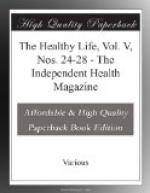faculty knew thirty years ago about, e.g., fresh
air for consumptives. There is not a word said
in this article (which is a sort of programme of
the weighty matters for discussion) on the relation
of food to the body. That question probably 4950
of them believe was settled by the eminent physiologists
who compiled those “food-tables” years
ago—and in so doing went far to pave the
way for the modern frightful increase of cancer,
Bright’s disease, etc., as well as for
“scientific” horrors like anti-toxin, tuberculin—not
to mention compulsory eugenics!
J. METHUEN.
HEALTH THROUGH READING.
Do many people consider reading from the point
of view of health of
mind and body—of refreshment in times
of struggle—of recuperation
after knock-down blows of sorrow, disappointment
or misfortune?
Let us begin by saying that some of the greatest books are not to be read by everybody at all seasons. When one’s heart or ankles are weak, one does not start to climb mountains, or one may end as a corpse or a cripple. So with one’s soul under shock or stress. Personally, I can imagine nothing more cruel than the action of two women, one a story-teller of great repute among the “goody,” who, to a specially stricken and lonely young widow, tendered as “bed-side books,” Victor Hugo’s Les Miserables and Browning’s poignant The Ring and the Book. If they had wished to make her realise to the bitterest depths the awfulness of the world wherein she was left alone, and the blackest depravity of the human nature around her, they could not have done differently. Les Miserables she read till she reached the dreadful scene where a vicious cad hurls snowballs at the helpless Fantine. Then the strong instinct of self-preservation made her put the book aside—not to touch it again for nearly thirty years. With The Ring and the Book her mind was too wrung and too weary to wrestle—all it could receive was a picture of wronged innocence, and especially of the rampant forces of evil with which she was left to contend. With the same want of tact and judgment, if with unconscious cruelty, the gloomy, fateful Bride of Lammermoor was selected out of all Scott’s novels for the reading of a very homesick youth, solitary in a strange country!
Yet we must always remember that, as in affairs of the body so of the spirit, “what is one man’s meat may be another man’s poison.” Some of the wisest and most successful nurses or doctors will occasionally permit an invalid to indulge in a longed-for diet which would certainly never be prescribed. They know that idiosyncrasy follows no exactly known rule. So we could tell of one who, amid the dry agnosticism of the later half of last century, had felt her faith, not indeed extinguished, but obscured and darkened. From the perusal of certain writers she had shrunk, perhaps with cowardice. They were put on such a pinnacle




